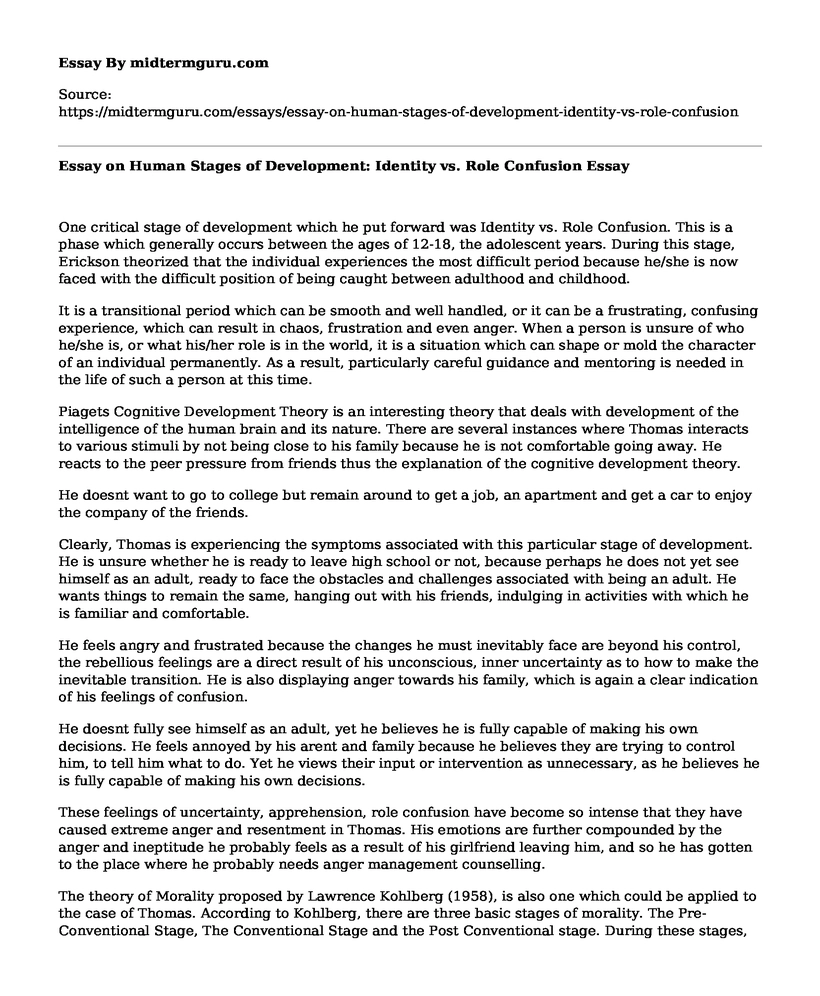One critical stage of development which he put forward was Identity vs. Role Confusion. This is a phase which generally occurs between the ages of 12-18, the adolescent years. During this stage, Erickson theorized that the individual experiences the most difficult period because he/she is now faced with the difficult position of being caught between adulthood and childhood.
It is a transitional period which can be smooth and well handled, or it can be a frustrating, confusing experience, which can result in chaos, frustration and even anger. When a person is unsure of who he/she is, or what his/her role is in the world, it is a situation which can shape or mold the character of an individual permanently. As a result, particularly careful guidance and mentoring is needed in the life of such a person at this time.
Piagets Cognitive Development Theory is an interesting theory that deals with development of the intelligence of the human brain and its nature. There are several instances where Thomas interacts to various stimuli by not being close to his family because he is not comfortable going away. He reacts to the peer pressure from friends thus the explanation of the cognitive development theory.
He doesnt want to go to college but remain around to get a job, an apartment and get a car to enjoy the company of the friends.
Clearly, Thomas is experiencing the symptoms associated with this particular stage of development. He is unsure whether he is ready to leave high school or not, because perhaps he does not yet see himself as an adult, ready to face the obstacles and challenges associated with being an adult. He wants things to remain the same, hanging out with his friends, indulging in activities with which he is familiar and comfortable.
He feels angry and frustrated because the changes he must inevitably face are beyond his control, the rebellious feelings are a direct result of his unconscious, inner uncertainty as to how to make the inevitable transition. He is also displaying anger towards his family, which is again a clear indication of his feelings of confusion.
He doesnt fully see himself as an adult, yet he believes he is fully capable of making his own decisions. He feels annoyed by his arent and family because he believes they are trying to control him, to tell him what to do. Yet he views their input or intervention as unnecessary, as he believes he is fully capable of making his own decisions.
These feelings of uncertainty, apprehension, role confusion have become so intense that they have caused extreme anger and resentment in Thomas. His emotions are further compounded by the anger and ineptitude he probably feels as a result of his girlfriend leaving him, and so he has gotten to the place where he probably needs anger management counselling.
The theory of Morality proposed by Lawrence Kohlberg (1958), is also one which could be applied to the case of Thomas. According to Kohlberg, there are three basic stages of morality. The Pre-Conventional Stage, The Conventional Stage and the Post Conventional stage. During these stages, the individual develops different levels of morality, which help to determine his or her behavior to a large extent.
During the Pre-Conventional stage, usually occurring in childhood, morality is determined based on standards established by those in authority, coupled with the fear of punishment. Children are unable to truly tell right from wrong, and so must be told, based on social norms and standards.
During the Conventional Stage, individuals begin to internalize the established morals of society, choosing to do so to fit in and meet societal expectations. They gain a better understanding of why certain behaviors are acceptable or not, but in this stage, they will often choose to go along with what is expected of them, even if they themselves see those behaviours as wrong.
It is this stage which seems most applicable to Thomas. He has learned that certain things are expected of him going to college, getting a certain type of education, maintaining certain types of relationships. He is desirous of meeting social expectations, but at the same time wants to do what he thinks is best for him.
Another indication of Thomas conflicting feelings could be the fact that he attempts to vent his anger and frustration in the privacy of his room, when no one else is around, he has feelings of remorse about showing this type of behavior around others as he believes it will be frowned upon and disapproved of.
So despite his personal misgivings about what is happening in his life, and where things seem to be headed as opposed to where he would want them to be, he attempts to control outward manifestations of these feelings, and maintain his status as a morally upright citizen.
In conclusion, human behavior can be predicted and even explained through various theories psychologically. These theories are capable of explaining the interaction and reaction of human body to various stimuli. There are some traits that might stick with ones personality till death but at the same time there are specific behaviors that changes with time.
ReferencePapalia, D., Olds, S., & Feldman, R. (2009). Human development (1st ed.). New York: McGraw-Hill.
Cite this page
Essay on Human Stages of Development: Identity vs. Role Confusion. (2021, Jun 03). Retrieved from https://midtermguru.com/essays/essay-on-human-stages-of-development-identity-vs-role-confusion
If you are the original author of this essay and no longer wish to have it published on the midtermguru.com website, please click below to request its removal:
- Trauma Informed Parents: Analysis of the Website
- Paper Example on OCD and OCPD Conditions
- Experience with Psychiatrists - Essay Sample
- Essay Sample on Bulimia Nervosa
- Paper Example on Culture-Bound Syndromes: Bipolar Disorder
- Literary Analysis Essay on the End of Overeating
- Paxil: Antidepressant Prescription to Treat Anxiety Disorders and Stress - Essay Sample







